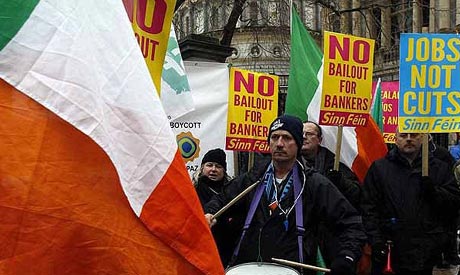
Protesters turned out in force in Ireland when the government voted on the country's toughest ever budget including €6bn in cuts and tax rises. (Photo: Reuters)
The Irish government may be forced to cut public sector wages, breaking a key pay agreement with unions, if spending targets under its EU/IMF bailout are to be met, the health minister said on Friday.
James Reilly, whose department is under pressure to rein in a large overspend, was the first minister to raise the prospect of public pay cuts in the upcoming budget.
That would require a renegotiation of the so-called Croke Park agreement, a 2010 deal widely credited with sparing Ireland the kind on industrial action that hit fellow EU/IMF recipient Greece.
Reilly told state broadcaster RTE his department would have to find 700 million euros of savings in its budget next year.
"If 70 per cent of my budget is pay and I've exhausted all my options, then clearly pay becomes an issue," Reilly said.
Ireland's health department, which accounts for almost a third of all government spending, had to cut 500 million euros this year but a European Commission report found that to date, only 22 per cent of that had been achieved.
The department said on Thursday it would cut back on care for the elderly and overtime pay to find 130 million euros ($163 million) of new savings.
Reilly's comments reflect tensions between his centre-right Fine Gael party and centre-left junior governing partner Labour over plans for December's budget.
A Labour Party minister on Thursday said that Ireland's austerity budget could weaken the coalition government, giving it a "middling to good" chance of surviving into next year.
Fine Gael members of parliament have criticised the Croke Park deal which protects much of Labour's public sector support base who saw their wages cut by an average of 15 per cent before the agreement was struck six months ahead of Ireland entering its bailout programme.
The deal, which promised no cuts in basic pay in exchange for reform of working practices, is due to run until 2014.
Short link: